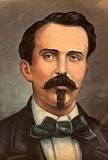
Carlos Manuel de Céspedes was a Cuban independence leader, who started the Ten Years' War by taking up arms against the Spanish government on October 10, 1868, at his La Demajagua Sugar Mill.
He was born in Bayamo on Sunday, April 18, 1819. His childhood was spent in the countryside, on the haciendas owned by his wealthy family: Limones Abajo, Los Mangos, San Rafael de la Junta and San Joaquín, the first leased from the State dedicated to the cattle ranch.
His primary education was at home and then, almost a teenager, he completed his higher studies in Bayamo, from 1832 to 1835, Latin, Logic, Physics, among other subjects.
He continued his preparation in Havana at the San Carlos Seminary. He entered the University in 1836 and graduated with a Bachelor of Laws on January 22, 1838.
He returned to Bayamo and married in 1839 his first cousin, María del Carmen Céspedes y del Castillo, with whom he had three children. In 1840 he sailed for Spain and settled in the city of Barcelona. There he entered the University graduating two years later with a Law Degree. He then visited France, England, Germany, Italy and as far as Constantinople he went before returning to Cuba.
He opened his law firm in Bayamo in 1844. But since he did not hide his independence ideas, he was imprisoned and exiled on several occasions, at the beginning of 1851 he to Palma Soriano. At the end of the same year he was deported to Baracoa. In 1855 he was confined aboard the Sovereign ship, a veteran of the Battle of Trafalgar, which was anchored in the bay of Santiago de Cuba.
The day after his uprising in his sugar mill La Demajagua, he took advantage of the night to stealthily attack the Spanish garrison stationed in the town of Yara with his small army.
But the results were not as expected. The attackers were unaware that the Spanish had received a considerable reinforcement in men. They had to scatter in various directions.
Céspedes managed to regroup a group of combatants. In the midst of that difficult situation, someone exclaimed despondently;: “Everything has been lost”, to which he answered with energy and certainty:
“There are still twelve men left; enough to make Cuba independent”.
The revolution advances. They rise up in arms in Camagüey and in Las Villas. The representatives of these two territories and the one of the East meet in the city of Guáimaro, where the Constituent Assembly elects him President of the Republic in Arms.
In the Assembly, Céspedes "opposed the approval of forms of government that, being extremely democratic and republican, would limit the powers of the executive and the General in Chief to lead the war, since he firmly maintained that in order to have a Republic, first war had to be waged, and it demanded a central power that would facilitate the unity of the command».
He could not ignore that from that moment his hands were tied to rule. Administratively, the House of Representatives could decide and approve what it deemed convenient. And it did.
His government was weighed down by incompatibility with the members of the House of Representatives and tainted with intrigue, caudillismo, and regionalism, among other disastrous manifestations.
He knew of the conspiracy that was being hatched to replace him as president and as a man of honor, he sacrificed his ideas to maintain the unity that the moment required.
He married a second time in November 1869, he was 69 years old. From that marriage he had three children: Oscar, and the twins Gloria and Carlos.
On October 27, 1873, in the Bijagual camp, he was deposed as president by the representatives of the Chamber. He, with discipline, complied with the decision. To oppose to that decision would have caused a division among Cubans capable of destroying the revolution.
So they forced him to accompany the new government and the Chamber for two months. They denied him the exit to abroad. They banished him to the San Lorenzo farm, in the Sierra Maestra, and the government denied him an escort.
They wanted to break the worthy and uncompromising patriot who declared anyone who entered into negotiations with the Spanish to be a traitor. And they didn't.
Let us remember that when the Captain General of the Island, Knight of Rhodes, sent him a message informing him that his youngest son, Oscar, had been captured and sentenced to death, he proposed the life of his son through a personal arrangement.
Céspedes' response was blunt:
"Oscar is not my only son, I am the father of all Cubans who have died for the Revolution."
And that exemplary patriot who, because of his attitude, the Cubans proclaimed him Father of the Nation, died in San Lorenzo fighting against a Spanish column on February 27, 1874, abandoned, alone and in absolute poverty.
